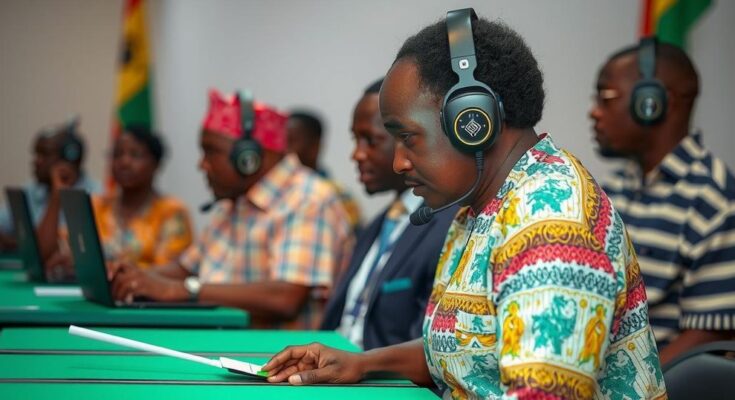On December 7, 2024, Ghanaians will elect a new president and Parliament members amid economic struggles and political challenges. The NDC and NPP are the major parties contesting, facing concerns over electoral transparency and past violence. High voter turnout is expected, and the election’s outcome holds significant implications for democracy in Ghana and the broader region.
On December 7, 2024, Ghanaians will engage in pivotal elections to select their new president and members of Parliament across 275 constituencies. Voters will choose from twelve presidential candidates, but realistically, the contest will primarily revolve around the National Democratic Congress (NDC) and the New Patriotic Party (NPP), the latter of which governs currently. Incumbent President Nana Akufo-Addo is unable to seek re-election due to term limits.
Key issues shaping this election include significant economic hardship and political friction that deeply influence voter sentiment. Ghanaians are principally concerned about the faltering economy and the rising cost of living. The Ghanaian cedi has depreciated substantially, losing approximately two-thirds of its value against the US dollar over the past five years. Additionally, the NDC has raised questions regarding the Electoral Commission’s transparency and has postponed signing a peace agreement with the National Peace Council to ensure adherence to principles promoting a peaceful electoral environment. Reports indicate the prevalence of corruption and financial mismanagement, with notable instances of elected officials misappropriating state resources.
For the 2024 elections, high voter turnout is anticipated following the previous election’s turnout of 78.89%. Yet, there exists a palpable risk of electoral violence, which could destabilize Ghana’s democratic framework. Such violence often arises in majoritarian systems, where electoral outcomes can mean vastly different prospects for the parties involved. The dangers of resource misappropriation, hate speech, and manipulation tactics are exacerbated by the competitive nature of elections in Ghana, which have previously culminated in tragic consequences, such as the loss of five lives during the 2020 elections.
Candidates Mahamudu Bawumia (NPP) and John Mahama (NDC) stand as the leading contenders. Bawumia previously served as Vice President and has held various critical roles at the Bank of Ghana, while Mahama has a record as president from 2012 to 2017 and a history of fierce electoral contests against the NPP. With the NPP aiming to secure a third consecutive victory, the stakes for the upcoming election are indeed high, encapsulated by the phrase, “breaking the eight.”
This election marks a crucial moment for Ghana’s democracy, rendering it imperative not just for the nation but also for the broader West African region. Historically viewed as a model of democratic integrity, Ghana’s electoral processes must be transparent and peaceful to counteract the growing instability that threatens democracy across the continent. A successful election outcome in Ghana could serve as a stabilizing force amidst regional democratic challenges.
The upcoming elections in Ghana represent a significant moment for the country’s political landscape. With the re-introduction of multiparty politics in 1992, the NDC and the NPP have remained the dominant political forces in Ghana’s electoral politics. Economic pressures and corruption concerns have been recurrent themes influencing voter behavior and perceptions of integrity within the political process. Given Ghana’s previous electoral violence, the stakes for maintaining a peaceful democratic environment are exceedingly high, reflecting broader implications for West Africa’s political stability.
In summary, the December 2024 election in Ghana is marked by critical economic challenges and intense political rivalries. With leading candidates from established political backgrounds, the election not only represents a contest for power but also the resilience of Ghana’s democratic values. As the country prepares to vote, ensuring a transparent and secure electoral process remains imperative for safeguarding democracy not only in Ghana but across West Africa.
Original Source: www.iri.org




